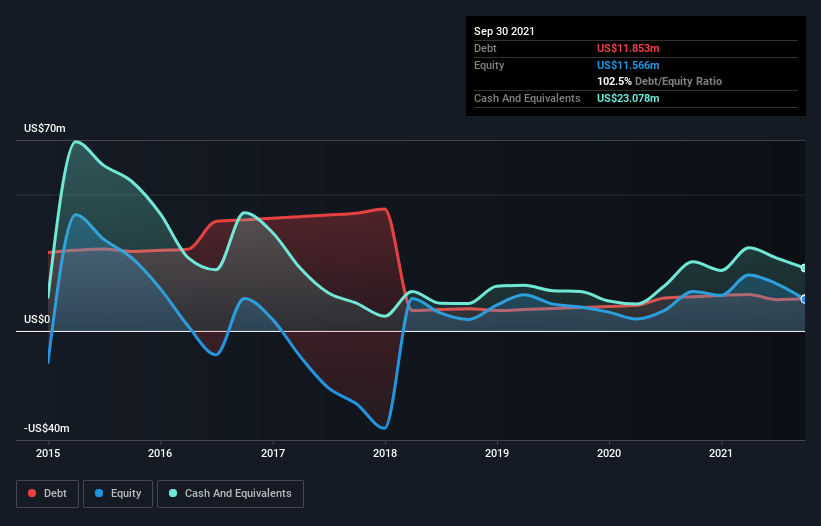
Warren Buffett famously said, 'Volatility is far from synonymous with risk.' It's only natural to consider a company's balance sheet when you examine how risky it is, since debt is often involved when a business collapses. As with many other companies Avinger, Inc. (NASDAQ:AVGR) makes use of debt. But should shareholders be worried about its use of debt?
Why Does Debt Bring Risk?
Generally speaking, debt only becomes a real problem when a company can't easily pay it off, either by raising capital or with its own cash flow. If things get really bad, the lenders can take control of the business. However, a more common (but still painful) scenario is that it has to raise new equity capital at a low price, thus permanently diluting shareholders. Of course, debt can be an important tool in businesses, particularly capital heavy businesses. When we think about a company's use of debt, we first look at cash and debt together.
See our latest analysis for Avinger
How Much Debt Does Avinger Carry?
As you can see below, Avinger had US$11.9m of debt at September 2021, down from US$12.5m a year prior. But on the other hand it also has US$23.1m in cash, leading to a US$11.2m net cash position.

A Look At Avinger's Liabilities
According to the last reported balance sheet, Avinger had liabilities of US$7.44m due within 12 months, and liabilities of US$14.7m due beyond 12 months. Offsetting these obligations, it had cash of US$23.1m as well as receivables valued at US$1.40m due within 12 months. So it actually has US$2.31m more liquid assets than total liabilities.
This surplus suggests that Avinger has a conservative balance sheet, and could probably eliminate its debt without much difficulty. Succinctly put, Avinger boasts net cash, so it's fair to say it does not have a heavy debt load! There's no doubt that we learn most about debt from the balance sheet. But ultimately the future profitability of the business will decide if Avinger can strengthen its balance sheet over time. So if you're focused on the future you can check out this free report showing analyst profit forecasts.
In the last year Avinger wasn't profitable at an EBIT level, but managed to grow its revenue by 22%, to US$10m. With any luck the company will be able to grow its way to profitability.
So How Risky Is Avinger?
We have no doubt that loss making companies are, in general, riskier than profitable ones. And in the last year Avinger had an earnings before interest and tax (EBIT) loss, truth be told. Indeed, in that time it burnt through US$15m of cash and made a loss of US$21m. Given it only has net cash of US$11.2m, the company may need to raise more capital if it doesn't reach break-even soon. With very solid revenue growth in the last year, Avinger may be on a path to profitability. By investing before those profits, shareholders take on more risk in the hope of bigger rewards. The balance sheet is clearly the area to focus on when you are analysing debt. But ultimately, every company can contain risks that exist outside of the balance sheet. Case in point: We've spotted 5 warning signs for Avinger you should be aware of, and 1 of them is a bit concerning.
If you're interested in investing in businesses that can grow profits without the burden of debt, then check out this free list of growing businesses that have net cash on the balance sheet.
New: Manage All Your Stock Portfolios in One Place
We've created the ultimate portfolio companion for stock investors, and it's free.
• Connect an unlimited number of Portfolios and see your total in one currency
• Be alerted to new Warning Signs or Risks via email or mobile
• Track the Fair Value of your stocks
This article by Simply Wall St is general in nature. We provide commentary based on historical data and analyst forecasts only using an unbiased methodology and our articles are not intended to be financial advice. It does not constitute a recommendation to buy or sell any stock, and does not take account of your objectives, or your financial situation. We aim to bring you long-term focused analysis driven by fundamental data. Note that our analysis may not factor in the latest price-sensitive company announcements or qualitative material. Simply Wall St has no position in any stocks mentioned.
Have feedback on this article? Concerned about the content? Get in touch with us directly. Alternatively, email editorial-team (at) simplywallst.com.
About NasdaqCM:AVGR
Avinger
A commercial-stage medical device company, designs, manufactures, and sells a suite of image-guided and catheter-based systems used by physicians to treat patients with peripheral artery disease (PAD) primarily in the United States and Germany.
Moderate with mediocre balance sheet.
Similar Companies
Market Insights
Community Narratives




